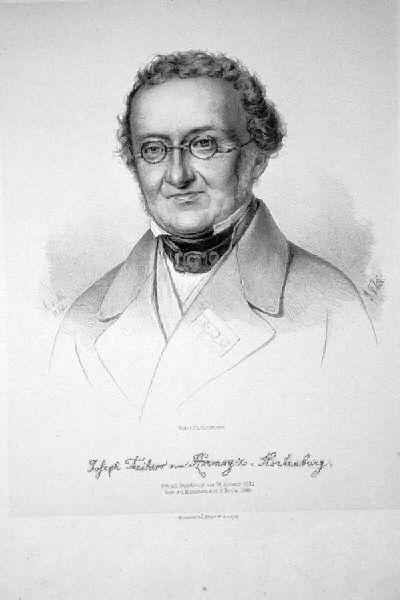<Back to Index>
- Historian and Diplomat Joseph Hormayr, Baron zu Hortenburg, 1781
- Composer Sebastián Iradier Salaberri, 1809
- 8th Shogun of the Ashikaga Shogunate Ashikaga Yoshimasa, 1435
PAGE SPONSOR

Joseph Hormayr, Baron zu Hortenburg (German: Joseph Hormayr Freiherr zu Hortenburg, also known as Joseph Freiherr von Hormayr zu Hortenburg) (20 January 1781 or 1782 - 5 October 1848) was an Austrian and German statesman and historian.
He was born at Innsbruck. After studying law in his native town, and attaining the rank of captain in the Tirolese Landwehr, the young man, who had the advantage of being the grandson of Joseph von Hormayr (1705 - 1778), chancellor of Tirol, obtained a post in the foreign office at Vienna (1801), from which he rose in 1803 to be court secretary and, being a near friend of the Archduke Johann of Austria, director of the secret archives of the state and court for thirteen months. In 1803 he married Therese Anderler von Hohenwald.
During the insurrection of 1809, by which the Tirolese sought to throw off the Bavarian supremacy confirmed by the treaty of Pressburg, Hormayr was the mainstay of the Austrian party, and assumed the administration of everything (especially the composition of proclamations and pamphlets); but, returning home without the prestige of success, he fell, in spite of the help of the Archduke John, into disfavour both with the emperor Francis II, Holy Roman Emperor and with Prince Metternich, and at length, when in 1813 he tried to stir up a new insurrection in Tirol, he was arrested and imprisoned at Munkatt.
In 1816 some amends were made to him by his appointment as imperial historiographer; but so little was he satisfied with the general policy and conduct of the Austrian court that in 1828 he accepted an invitation of King Louis I to the Bavarian capital, where he became ministerial councillor in the department of foreign affairs.
In 1832 he was appointed Bavarian minister - resident at Hanover, and from 1837 to 1846 he held the same position at Bremen. Together with Count Johann Friedrich von der Decken (1769 - 1840) he founded the Historical Society of Lower Saxony (Historischer Verein fur Niedersachsen). The last two years of his life were spent at Munich as superintendent of the national archives.
He died in October 1848 of unknown causes, aged 66 or 67. Hormayr's literary activity was closely conditioned by the circumstances of his political career and by the fact that Johannes von Müller (d.
1811) was his teacher: while his access to original documents gave
value to his treatment of the past, his record or criticism of
contemporary events received authority and interest from his personal
experience. But his history of the Tirolese rebellion is far from being
impartial; for he always liked to put himself into the first place, and
the merits of Andreas Hofer and
of other leaders are not sufficiently acknowledged. In his later
writings he appears as a keen opponent of the policy of the court of
Vienna.